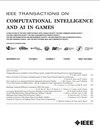Self-Adaptation of Playing Strategies in General Game Playing
Q2 Computer Science
IEEE Transactions on Computational Intelligence and AI in Games
Pub Date : 2014-12-01
DOI:10.1109/TCIAIG.2013.2275163
引用次数: 64
Abstract
The term general game playing (GGP) refers to a subfield of AI which aims at developing agents able to effectively play many games from a particular class (finite, deterministic). It is also the name of the annual competition proposed by Stanford Logic Group at Stanford University (Stanford, CA, USA), which provides a framework for testing and evaluating GGP agents. In this paper, we present our GGP player which managed to win four out of seven games in the 2012 preliminary round and advanced to the final phase. Our system (named MINI-Player) relies on a pool of playing strategies and autonomously picks the ones which seem to be best suited to a given game. The chosen strategies are combined with one another and incorporated into the upper confidence bounds applied to trees (UCT) algorithm. The effectiveness of our player is evaluated on a set of games from the 2012 GGP Competition as well as a few other, single-player games. The paper discusses the efficacy of proposed playing strategies and evaluates the mechanism of their switching. The proposed idea of dynamically assigning search strategies during play is both novel and promising.一般博弈中博弈策略的自适应
通用游戏玩法(GGP)指的是AI的一个子领域,它旨在开发能够有效地玩特定类别(有限的,确定性的)许多游戏的代理。这也是斯坦福大学(Stanford, CA, USA)斯坦福逻辑小组提出的年度竞赛的名称,该竞赛为测试和评估GGP代理提供了一个框架。在本文中,我们介绍了我们的GGP选手在2012年的预赛中取得了七场比赛中的四场胜利,并进入了决赛阶段。我们的系统(名为MINI-Player)依赖于一系列游戏策略,并自主选择最适合特定游戏的策略。将选择的策略相互组合,并纳入应用于树的上置信区间(UCT)算法。我们的玩家的有效性是根据2012年GGP竞赛的一系列游戏以及其他一些单人游戏来评估的。本文讨论了所提出的博弈策略的有效性,并评估了它们的转换机制。在游戏过程中动态分配搜索策略的想法既新颖又有前途。
本文章由计算机程序翻译,如有差异,请以英文原文为准。
求助全文
约1分钟内获得全文
求助全文
来源期刊

IEEE Transactions on Computational Intelligence and AI in Games
COMPUTER SCIENCE, ARTIFICIAL INTELLIGENCE-COMPUTER SCIENCE, SOFTWARE ENGINEERING
CiteScore
4.60
自引率
0.00%
发文量
0
审稿时长
>12 weeks
期刊介绍:
Cessation. The IEEE Transactions on Computational Intelligence and AI in Games (T-CIAIG) publishes archival journal quality original papers in computational intelligence and related areas in artificial intelligence applied to games, including but not limited to videogames, mathematical games, human–computer interactions in games, and games involving physical objects. Emphasis is placed on the use of these methods to improve performance in and understanding of the dynamics of games, as well as gaining insight into the properties of the methods as applied to games. It also includes using games as a platform for building intelligent embedded agents for the real world. Papers connecting games to all areas of computational intelligence and traditional AI are considered.
 求助内容:
求助内容: 应助结果提醒方式:
应助结果提醒方式:


